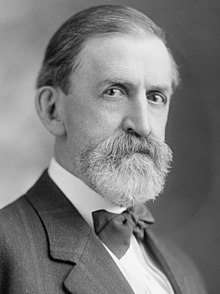John W. Kern
John Worth Kern (born December 20, 1849 in Alto , Howard County , Indiana , † August 17, 1917 in Asheville , North Carolina ) was an American politician who represented the state of Indiana in the US Senate . He was the Democratic Party's candidate for vice presidency alongside William Jennings Bryan in the 1908 presidential election .
Professional and political career
John Kern attended Indiana Public Schools and Normal College in Kokomo ; after that he worked as a teacher. In 1869 he graduated from the University of Michigan with a law degree , after which he was admitted to the bar that same year and began practicing in Kokomo. From 1871 to 1884 he was a trial lawyer for this city; between 1885 and 1889 he served as clerk to the Indiana Supreme Court.
Kern's first application for political office was unsuccessful: in 1870 he missed the election to the Indiana House of Representatives . Between 1893 and 1897 he sat in the Senate of his state; at the same time he held the post of assistant federal attorney for Indiana. From 1897 to 1901 he worked as a City Solicitor for the City of Indianapolis . Two candidacies for governor of Indiana failed in 1900 and 1904. After the second defeat, Kern went back to work as a lawyer, traveled to Europe and spent six months in a sanatorium in Asheville, North Carolina, in poor health .
Candidate for the Vice Presidency and Senator
In the run-up to the presidential election in 1908, the Democratic Party agreed on John Kern as a compromise candidate alongside William Jennings Bryan from Nebraska , who was running for the third time for the presidency . At the Democratic National Convention in Denver , he received in contrast to Bryan, against whom John Albert Johnson from Minnesota stood , all 1002 delegate votes. In the November 3 election, however, the Democrats suffered a significant defeat. William Howard Taft and his running mate James S. Sherman received 321 electoral votes, Bryan and Kern only 162.
Kern had applied for the Democratic nomination as US Senator at the same time, but was inferior to Benjamin F. Shively . Two years later, the Indiana legislature elected him to Congress , where he assumed his mandate from March 4, 1911. At Shively's side, Kern was now part of the progressive wing of the Democratic Party in the Senate and campaigned against the conservative party leadership. From 1912 he played an essential role in the efforts of the progressive Democrats to reform the party. After Woodrow Wilson's victory in this year's presidential election and the simultaneous entry of 11 more progressive party friends into the Senate, Kern was elected Democratic Majority Leader . He held this post from 1913 to 1917.
As the majority leader, Kern played a key role in reforming the Senate and his party. He worked closely with President Wilson and made frequent private visits. In the Senate, he ensured that Wilson's legislative initiatives were adopted, including a tariff reform, an antitrust law, the establishment of the Federal Trade Commission and the first-time collection of an income tax , which was regulated by the 16th Amendment .
After six years, however, Kern had to leave the Senate on March 3, 1917. In the direct election in Indiana, for the introduction of which he had previously campaigned for by the 17th Amendment, he was defeated by Republican Harry S. New . At the urging of William Jennings Bryan, President Wilson considered calling Kern to high public office, but the former senator passed away in Asheville just five months after retiring from Congress. First, the country estate of his family near Hollins ( Virginia buried), core body twelve years later at the Crown Hill Cemetery buried in Indianapolis for a second time.
Web links
- John W. Kern in the Biographical Directory of the United States Congress (English)
- John W. Kern in the database of Find a Grave (English)
| personal data | |
|---|---|
| SURNAME | Kern, John W. |
| ALTERNATIVE NAMES | Kern, John Worth (full name) |
| BRIEF DESCRIPTION | American politician |
| DATE OF BIRTH | December 20, 1849 |
| PLACE OF BIRTH | Alto , Howard County , Indiana |
| DATE OF DEATH | 17th August 1917 |
| Place of death | Asheville , North Carolina |

